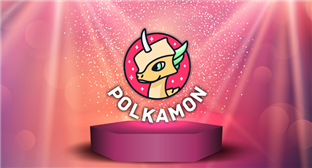NFTs have gained considerable popularity in recent times, becoming an essential part of the blockchain ecosystem, with uses in blockchain gaming, collectibles, and digital art spaces. An NFT is a type of token or unique digital asset; each NFT has its own unique property or identity, making them unique and non-interchangeable.
Each token’s unique attributes make them impossible to exchange, replace or create copies, making them scarce and giving them value. NFTs are increasing in popularity as an asset class, with a significant increase in market capitalization. The NFT industry’s market capitalization has increased from $31 million in 2017 to more than $300 million by the end of 2020.
What is Polkamon?
Polkamon allows users to collect extremely rare Digital Monsters. These collectibles can be integrated into several blockchain-connected products. Digital collectibles like Polkamon are different from physical collectible items.
Polkamon are animated, digital collectibles. Each collectible has varying scarcity and is backed by a unique NFT. They can also be unpacked using the $PMON tokens.
Polkamon’s properties are described through a rich metadata set. They can also be integrated into Layer 2 applications. Non-fungible tokens also back Polkamon, allowing them to be integrated into blockchain-based games or digital art.
Who Is The Team Behind Polkamon, And What Is Their Vision?
The team behind Polkamon describes their vision as three layers that can become the building blocks for a sustainable and modern collectibles ecosystem. The base layer is the decentralized ownership system based on NFTs that is supported by an ERC20 token. The ERC20 token improves liquidity and makes trade easier.
On this base layer is the second layer; the second layer enriches NFTs through detailed metadata and rich visuals. The third layer is the application layer, on which proven ownership and visuals, and metadata help create a universe of utilization.
- Different utilization layers: The team at Polkamon understands that the key to sustainable growth depends on the quantity and the quality of utilization layers. As a result, they are building partnerships with several players for Layer 2 utilization in the game and arts space.
- Visuals and metadata: Detailed visuals and metadata is one of the most significant growth drivers for Polkamon. They are easy to integrate with Polkamon. This can also act as a support layer for utilization applications.
- Decentralized NFTs and tokens: Decentralized NFT and token layers form the base of the Polkamon ecosystem. This ensures maximum trust when it comes to ownership and also provides significant supply advantages.
The team at Polkamon is led by Leif Eric Leiser, who is the CEO. The team also consists of Lennart Brandt and Finn Hansen.
What Are The Features Of Polkamon?
Polkamon has several features that set it apart from its peers. Some of the unique features are
- Staking: Receive additional $PMON rewards by staking $PMON.
- Ultra-Rare NFTs: Reveal ultra-rare Polkamon by unpacking $PMON tokens. Polkamon also allows you to swap NFTs for $PMON tokens.
- Cross-chain: Polkamon is available on multiple blockchains like Ethereum, Polkadot and several other blockchains that are gearing up to incorporate them.
- Polkamon is hyper-deflationary: Polkamon ensures a continued scarcity of your assets by burning a certain number of $Pmon tokens when a swap/reverse occurs.
- High-liquidity: The $PMON token adds significant liquidity to the Polkamon project, providing a swapping mechanism between $PMON and the NFTs.
- Scarcity: Each Polkamon is unique, existing in different shapes and colors. Each Polkamon has a different level of rarity, with some Polkamons falling in the ultra-rare category.
What Are The Characteristics Of Different Polkamon?
Each Polkamon exists in different shapes and with different characteristics. Some of the characteristics of different Polkamon are
- Colors: Polkamon come in different colors and hues, representing a shade of color in the rainbow..
- Glitter: Beautiful and elegant, these are among the rarest Polkamon that you can come across.
- Horn: Why does each Polkamno possess a horn? We don’t know. All we know is that they vary in shape and rarity.
- Ultra-rare: Ultra-rare Polkamon are the diamonds of the Polkamon universe. You could look everywhere for them and still not find them.
The Polkamon Ecosystem
The Polkamon ecosystem is an ecosystem of interconnected apps and marketplaces. You can explore other collections and present your own collection through native mobile apps. You can also buy $PMON tokens using apps and also gather information about the Polkamon universe.
You can also utilize native mobile widgets, keeping your most valuable Polkamon with you at all times.
Polkamon are digital collectibles that blockchain-based ecosystems can utilize. The team behind Polkamon hopes that the existence of Polkamon in native apps and widgets will accelerate the process of blockchains utilizing Polkamon.
How Can Polkamon Be Utilized?
Polkamon have several possibilities to be utilized in different ways. Unlike physical collectibles that are inaccessible to modern arts and games, Polkamon, being digital collectibles that are backed by non-fungible tokens, can be easily integrated into different products connected to different blockchains. Some of the uses are
- Layer 2 utilization: It is very easy to integrate Polkamon into Layer 2 utilization applications. They have a rich set of meta-data that describes every individual property of each individual Polkamon.
- Proof of ownership: The advantage of Polkamon is that non-fungible tokens back it. So the owner can integrate his or her collection into art or modern games.
Polkamon hopes to be the start of a future towards NFT based collectibles. The team hopes to kickstart the digital collectible ecosystem with a new kind of NFT-backed collectible.
Source: Read Full Article
